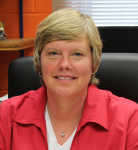Meeting challenges is a group effort

Editor's note: This is the third of a four-part interview with Fort Scott USD 234 Schools Superintendent Diane Gross on her first year in office and a look ahead for the school system. Part three looks at the process needed to overcome looming challenges. Part four will follow with the district's strengths.
To meet the challenges "and opportunities" of education today, Fort Scott Schools Superintendent Diane Gross said it is imperative to develop a plan and then get buy-in by all parties -- from the teachers and administrators to the public.
"We started by sharing financial information and having a discussion with our staff" about the challenges and the priorities.
"These are difficult conversations and not pleasant. But we needed to look at our staffing levels, put into place plans for curriculum assessment, review our faculty infrastructure and examine the need for expanded technology.
"With these expectations and new state and federal guidelines impacting Kansas and the rest of the country, we have to address staffing and curriculum and the integration of technology, for an alignment for the future, providing quality education for every student in the district.
"We want to help students develop a learning plan to focus not only on state and national areas of interest but to be able to pursue their dreams.
"The state is looking at different ways to measure student achievement. This is an opportunity for us to engage in meaningful decisions with kids and is designed with a component that they monitor their own programs.
"We are creating a quality instruction framework to meet the learning expectations for these standards," continued Gross.
"We put a direction in place for the district and are trying to put the pieces in place. We want a foundation to take action and implement.
"We will take our current staff and redefine some roles, so that we can provide support to our teaching staff."
That support will come from the building principals in an expanded role as instructional coaches.
"They will help teachers do better at the practice of teaching. We want this kind of training for our staff on a regular basis. Some teachers do this naturally in connecting with their students.
"Training will help them explain that. We see this as a three to five-year process for our entire staff. It's an investment of money but this will only be spent in certain ways, with high quality professional development, and not a one-day workshop. We see this as ongoing training, with follow-up visits, and outside sets of eyes. We'll be asking questions and documenting results.
"We want to provide professional development to our staff, and tailor that to their individual needs. It needs to be meaningful and enhance their skills.
"With the teacher and building principal evaluations, this is more of a professional learning opportunity. It's an engaging and reflective conversation to build upon the skills they already have. This piece will attach the student achievement performance and the teacher, administrator and superintendent performance. It's all tied together.
"Now, how kids are measured will be how we are measured.
"And that's about helping each individual student show growth over the year.
"For certified and classroom staff, they can delegate and grow, and be able to take on these opportunities to create a more positive future for our community.
"For our teaching staff, this is a huge change. And there's an uncertainty on what the state is expecting.
"But I believe all this will build leadership capacity and create ownership in these areas."
